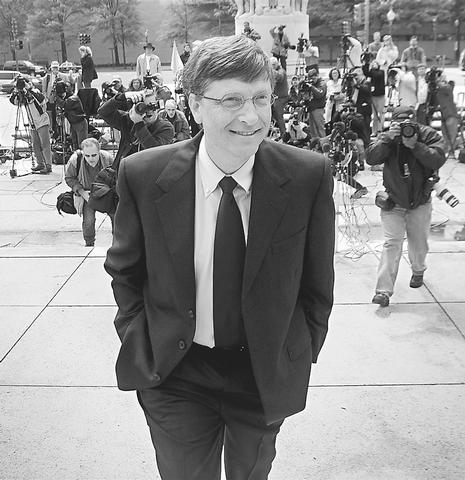Microsoft Corp Chairman Bill Gates, making his first courtroom appearance in a four-year-old antitrust fight, told a federal judge that a penalty proposal by nine states would force the company to give away software code that cost billions of dollars to develop.
In four hours of sparring with a lawyer for the states, Gates said the world's No. 1 software maker obeys the law and promotes innovation throughout the computer industry. He said the state plan is so broad it would fracture the Windows operating system that has been the industry standard for almost a decade.
"It takes away Microsoft's intellectual property and it gives it away for free for cloning," Gates said. The plan "does authorize the copying of virtually all of Windows."

PHOTO: AFP
Gates displayed little of the forgetfulness and evasiveness that, according to the original trial judge in the case, characterized videotaped answers he gave in an earlier phase of the legal fight. He answered all but a handful of the questions from state lawyer Steven Kuney head on.
US District Judge Colleen Kollar-Kotelly must decide whether to accept the Bush administration's settlement with Microsoft or impose stricter controls. As is her practice, she said little during the day's session, interjecting occasionally to resolve objections by Microsoft's lawyers or to tell Kuney and Gates not to interrupt one another.
Gates's testimony, which will continue today, came during cross-examination by Kuney.
"This proposed decree identifies no such boundaries." The states want to force Microsoft to devise a "modular" version of Windows so that computer makers can easily replace Microsoft programs with competing software.
The plan also would make Microsoft's Internet Explorer browser part of the public domain and force disclosure of more Microsoft code to let rival software easily run on Windows.
An appeals court last year ruled that Microsoft illegally protected its Windows monopoly, while overturning a judge's order to break up the company. The case is now assigned to Kollar- Kotelly to weigh new remedies in the event she decides the settlement is insufficient.
Microsoft shares fell US$1.61 to US$55.59 in trading on Monday.

US PUBLICATION: The results indicated a change in attitude after a 2023 survey showed 55 percent supported full-scale war to achieve unification, the report said More than half of Chinese were against the use of force to unify with Taiwan under any circumstances, a survey conducted by the Atlanta, Georgia-based Carter Center and Emory University found. The survey results, which were released on Wednesday in a report titled “Sovereignty, Security, & US-China Relations: Chinese Public Opinion,” showed that 55.1 percent of respondents agreed or somewhat agreed that “the Taiwan problem should not be resolved using force under any circumstances,” while 24.5 percent “strongly” or “somewhat” disagreed with the statement. The results indicated a change in attitude after a survey published in “Assessing Public Support for (Non)Peaceful Unification

The CIA has a message for Chinese government officials worried about their place in Chinese President Xi Jinping’s (習近平) government: Come work with us. The agency released two Mandarin-language videos on social media on Thursday inviting disgruntled officials to contact the CIA. The recruitment videos posted on YouTube and X racked up more than 5 million views combined in their first day. The outreach comes as CIA Director John Ratcliffe has vowed to boost the agency’s use of intelligence from human sources and its focus on China, which has recently targeted US officials with its own espionage operations. The videos are “aimed at

STEADFAST FRIEND: The bills encourage increased Taiwan-US engagement and address China’s distortion of UN Resolution 2758 to isolate Taiwan internationally The Presidential Office yesterday thanked the US House of Representatives for unanimously passing two Taiwan-related bills highlighting its solid support for Taiwan’s democracy and global participation, and for deepening bilateral relations. One of the bills, the Taiwan Assurance Implementation Act, requires the US Department of State to periodically review its guidelines for engagement with Taiwan, and report to the US Congress on the guidelines and plans to lift self-imposed limitations on US-Taiwan engagement. The other bill is the Taiwan International Solidarity Act, which clarifies that UN Resolution 2758 does not address the issue of the representation of Taiwan or its people in

SHIFT: Taiwan’s better-than-expected first-quarter GDP and signs of weakness in the US have driven global capital back to emerging markets, the central bank head said The central bank yesterday blamed market speculation for the steep rise in the local currency, and urged exporters and financial institutions to stay calm and stop panic sell-offs to avoid hurting their own profitability. The nation’s top monetary policymaker said that it would step in, if necessary, to maintain order and stability in the foreign exchange market. The remarks came as the NT dollar yesterday closed up NT$0.919 to NT$30.145 against the US dollar in Taipei trading, after rising as high as NT$29.59 in intraday trading. The local currency has surged 5.85 percent against the greenback over the past two sessions, central